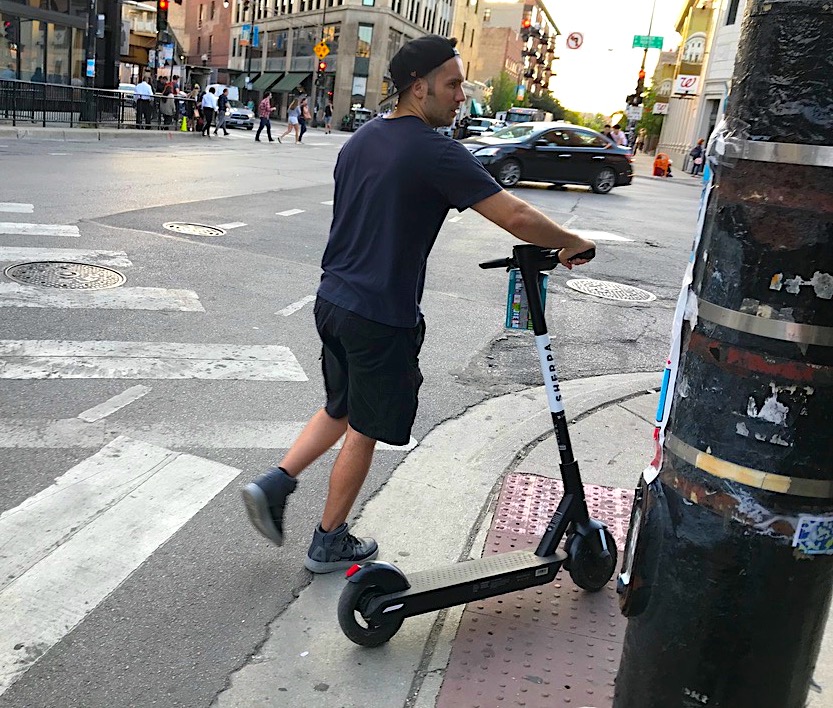A couple of weeks into Chicago’s dockless electric scooter pilot, the scooters have been undeniably popular in terms of rides, with 60,000 trips in one week, or an average of 3.4 rides per scooter per day. However, they've been getting a mixed reception overall.
While discussions about the pros and cons of e-scooters often focus on whether they're a safe mode for city streets, which is an certainly a valid question, more nuanced issues are also entering the dialogue. This is important, especially as the city considers whether to continue the program after October 15.
I asked a few scooter riders from different neighborhoods for their thoughts about the pilot and how it could be improved. Logan Square resident Eduardo Cordero told me that while he had a good time riding scooters with his friends, he said that he initially found locating and checking out a scooter to be a tedious process. “We didn’t want to have to download an app, so we were going use the Uber ones [the red JUMP scooters] because I already had the app,” he said. “Turns out that all the scooters were about a mile away, so we were kind of forced to download an app.”
Cordero added that even after downloading the app, they had to scan the QR code a few times before it worked. He said this was not a great first experience.
While he said the e-scooters were fun to ride, he is skeptical about whether scooters are practical for urban transportation. “It’s great for parks and trails but for commuting, it’s kind of messy,” he said.
Cordero mentioned that while the scooters seem to be appealing to young people, he wonders whether senior citizens are able to access them. “I have yet to see a single older person ride them.”
A common question about the scooters is how to make sure they are parked properly, on the sidewalk close to the curb, rather than strewn across sidewalks. “There needs to be a better option to put the scooters away because people just throw them anywhere,” Cordero emphasized.
On the other side of the city in Pilsen, local resident Paul Magaña said he has had a more positive experience. “I find the scooters to be extremely useful for commuting from one place to another. I can get to the train station in five minutes, when it normally takes me twenty minutes walking,” he said, adding that he enjoys riding scooters and appreciates that they're greener than driving or ride-hailing.
Magaña said he first rode an e-scooter in Denver, and because scooters were available in that city, he never had to use his Uber app. He added that Denver's streets seemed more scooter- and bike-friendly. “I love the fact that Chicago has decided to bring the scooters here, but I do think we need to work on creating safer routes for new and upcoming means of transportation,” he said.
Similarly to Cordero, Magaña had concerns and suggestions regarding scooter parking. “The city and the scooter companies need to create a plan for people not to leave the scooters laying around just anywhere and in the way of others. I know this is one of the main issues people have with the scooters, but this is just as simple as teaching people the proper way to park a scooter.”
Jasmín Martinez of Little Village has broader concerns about the relevance of the entire program. Martinez said she has ridden a scooter and it was fun, but she doesn’t see the value in doing so frequently because she says riding her bike is free and faster.
She added that she doesn't see scooters as being relevant to the immediate needs of her neighborhood. “I think it serves as a distraction, especially in working-class and poor communities because they do not add any real solutions to transportation issues that communities face... It’s a privilege to pay for every single [scooter] ride." She added that the scooters seem flimsy and disposable, and she doesn't expect many people will ride them once the weather gets colder.
Martinez said the focus of our city should be improving public transportation and providing subsidies for low-income Chicagoans to ride transit. "We need more accessible, affordable public transportation options... Who are these scooters really for? It’s never with the interest of working-class, BIPOC (Black, indigenous, people of color) communities.”




